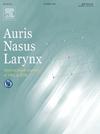Efficacy of vidian neurectomy in treating chronic rhinosinusitis with nasal polyps combined with allergic rhinitis: A systematic review and meta-analysis
IF 1.6
4区 医学
Q2 OTORHINOLARYNGOLOGY
引用次数: 0
Abstract
Objective
To evaluate the impact of additional vidian neurectomy or posterior nasal neurectomy in patients with chronic rhinosinusitis with nasal polyps (CRSwNP) and allergic rhinitis (AR), compared to the outcomes of conventional endoscopic sinus surgery alone.
Methods
Up to May 2024, six databases were systematically searched. We evaluated studies that compared the clinical improvement of chronic sinusitis-related symptoms and endoscopic findings between the neurectomy group (endoscopic sinus surgery plus vidian neurectomy or posterior nasal neurectomy) and the control group (endoscopic sinus surgery only).
Results
The neurectomy group showed a significant reduction in the Lund-Kennedy endoscopic score (SMD = -1.3163 [-1.6519; -0.9807]; I² = 53.3 %). However, this treatment did not have a significant effect on the Quality-of-life score (SMD = -0.1222 [-0.3427; 0.0983]; I² = 27.5 %) or patient-reported nasal symptom-related VAS scores (SMD = -1.6690 [-3.7062; 0.3682]; I² = 96.3 %). In the subgroup analyses of these results according to time points of measurement, the Lund-Kennedy endoscopic score was statistically lower in the treatment group during treatment periods (postop 6months, 12months, and 24months). However, there were no statistically significant differences in Quality-of-life score and VAS between the treatment and control groups during all treatment periods. There was no significant difference in the recurrent rate of CRS during the following up periods (odds ratio=0.5263 [0.1518; 1.8254], I2 = NA) between two groups. Regarding the adverse effect of neurectomy, this additional procedure did not induce the postoperative bleeding (odds ratio=0.8886 [0.3411; 2.3150]; I2 = 0.0 %) and dry eye related discomfort (odds ratio=65.3560 [0.1044; 40,908.1619]; I2 = 88.9 %) significantly compared to control group.
Conclusions
Additional neurectomy shows better efficacy in improving endoscopic findings and is safer in patients with CRSwNP combined with AR; however, more clinical studies are needed to evaluate its long-term symptomatic effects and disease recurrence.
维甸神经切除术治疗慢性鼻窦炎合并鼻息肉合并变应性鼻炎的疗效:系统回顾和荟萃分析。
目的:评价慢性鼻窦炎合并鼻息肉(CRSwNP)和变应性鼻炎(AR)患者加行鼻窦神经切除术或鼻后神经切除术的效果,并与单纯行常规鼻窦内窥镜手术的效果进行比较。方法:系统检索截至2024年5月的6个数据库。我们评估了比较神经切除术组(内窥镜鼻窦手术加vidian神经切除术或后鼻神经切除术)和对照组(仅内窥镜鼻窦手术)慢性鼻窦炎相关症状的临床改善和内窥镜检查结果的研究。结果:神经切除术组Lund-Kennedy内镜评分显著降低(SMD = -1.3163 [-1.6519;-0.9807);I²= 53.3%)。然而,这种治疗对生活质量评分(SMD = -0.1222 [-0.3427;0.0983);I²= 27.5%)或患者报告的鼻症状相关VAS评分(SMD = -1.6690 [-3.7062;0.3682);I²= 96.3%)。根据测量时间点对这些结果进行亚组分析,治疗组在治疗期间(停药后6个月、12个月和24个月)的lond - kennedy内镜评分有统计学意义。然而,在所有治疗期间,治疗组和对照组的生活质量评分和VAS均无统计学差异。随访期间CRS复发率差异无统计学意义(优势比=0.5263 [0.1518;[1.8254], I2 = NA)。关于神经切除术的不良反应,这一附加手术未引起术后出血(优势比=0.8886 [0.3411;2.3150);I2 = 0.0%)和干眼相关不适(优势比=65.3560 [0.1044;40908年.1619];I2 = 88.9%)显著高于对照组。结论:CRSwNP合并AR患者行额外神经切除术改善内镜表现的效果更好,且更安全;然而,需要更多的临床研究来评估其长期症状效果和疾病复发。
本文章由计算机程序翻译,如有差异,请以英文原文为准。
求助全文
约1分钟内获得全文
求助全文
来源期刊

Auris Nasus Larynx
医学-耳鼻喉科学
CiteScore
3.40
自引率
5.90%
发文量
169
审稿时长
30 days
期刊介绍:
The international journal Auris Nasus Larynx provides the opportunity for rapid, carefully reviewed publications concerning the fundamental and clinical aspects of otorhinolaryngology and related fields. This includes otology, neurotology, bronchoesophagology, laryngology, rhinology, allergology, head and neck medicine and oncologic surgery, maxillofacial and plastic surgery, audiology, speech science.
Original papers, short communications and original case reports can be submitted. Reviews on recent developments are invited regularly and Letters to the Editor commenting on papers or any aspect of Auris Nasus Larynx are welcomed.
Founded in 1973 and previously published by the Society for Promotion of International Otorhinolaryngology, the journal is now the official English-language journal of the Oto-Rhino-Laryngological Society of Japan, Inc. The aim of its new international Editorial Board is to make Auris Nasus Larynx an international forum for high quality research and clinical sciences.
 求助内容:
求助内容: 应助结果提醒方式:
应助结果提醒方式:


